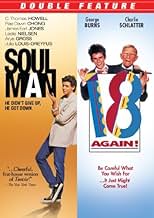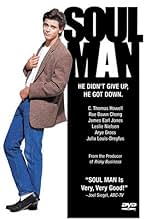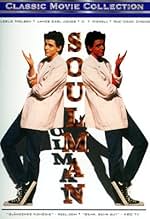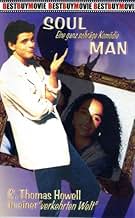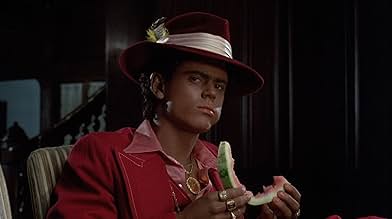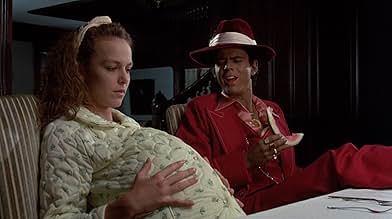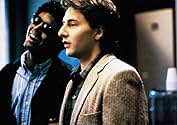Um seinen Traum vom Studium in Harvard zu verwirklichen, gibt sich ein verwöhnter Teenager als junger Schwarzer aus, um ein Vollstipendium zu erhalten.Um seinen Traum vom Studium in Harvard zu verwirklichen, gibt sich ein verwöhnter Teenager als junger Schwarzer aus, um ein Vollstipendium zu erhalten.Um seinen Traum vom Studium in Harvard zu verwirklichen, gibt sich ein verwöhnter Teenager als junger Schwarzer aus, um ein Vollstipendium zu erhalten.
- Bill Watson
- (as James B. Sikking)
- Mrs. Dorothy Watson
- (as Marie Cheatham)
- Barky Brewer
- (as Wally Ward)
- Ernie
- (as Dave Reynolds)
Empfohlene Bewertungen
C.Thomas Howell is so good in his role. His charm is so intoxicating and you always wanna laugh at him. He looks like a cuter version of steve-o from jackass, with discolored skin and a black curly 'fro! He looks so obviously NOT black.
The best part of this film is the editing style. I recently discovered the importance of editing; it's good that this one was edited at a very quick and entertaining pace, otherwise it would've seemed outdated by today.
I actually think a film like this would make it today, since there's a heavy backlash from the '90's 'political correctness' theme. There are some heavy themes here, (although it's a comedy) but C.Thomas Howell keeps you wanting more. Supporting roles from James Earl Jones, the character Sarah, and her son are all great, but C.Thomas Howell keeps this film timeless; he is perfect.
"frankly, your tone of voice."
i watched soul man twice at the cinema when it came out; i loved it to bits.
i thought the movie was warm and funny and dealt with a difficult subject in an imaginative and sincere way.
i found c thomas very likeable and i thought his relationship with rae dawn chong and her young son was believable and natural. james earl jones was fantastic too.
my fave thing about the movie is ayre gross. i loved him in coupe de ville and on ellen and he's excellent here as mark's smart-alec best friend gordo. the scene where he has to defend mark in court is so funny.
Mark Watson (C. Thomas Howell) is a rich white L.A. kid living a shallow life, but he does get accepted to Harvard Law, which is no small task. It's at this time that his father (James B. Sikking) takes the advice of a less than stable psychiatrist and cut his son off financially.
Mr. Watson: "Son I want to give you your manhood."
Mark: "What would that mean in practical terms?"
Mr. Watson: "Well, it means I want you to go to Harvard, I want you to work hard-- very very hard. I also want you to feel good about yourself. You wanna feel good about yourself don't you son?"
Mark: "Sure Dad."
Mr. Watson: "Ha ha ha. That's why I've decided to let you pay your own way."
Mark: (stunned beyond belief) "Dad. That's... that's a sweet gesture, but it's really not necessary."
Mr. Watson: "Oh I think it is."
Mark: "What are you saying dad?"
Mr. Watson: "I'm saying that I took the money in your tuition account and used it to buy timeshare in a condo in Barbados."
And there you have it. Confident, excited Mark was turned into desperate Mark. In his desperation he hatched a hair-brained scheme. He would make himself up to look Black in order to get the Henry Q. Bouchard scholarship which is reserved for qualified Black applicants. What could go wrong? As Mark put it,
"It's gonna be great! These are the 80's man, it's the Cosby decade. America loves Black people."
Oh, how wrong he was.
For me, this movie was the cinematic representation of the book "Black Like Me." In 1959 John Howard Griffin took some pills to darken his skin in order to experience what it was like to be Black. He wrote an incredible book about the experience. Soul Man is a more humorous version of that same experiment.
Mark slowly learned that everyone didn't love Black people and that this plot of his would be much tougher than he imagined. And that was the most pleasing part of the movie. Seeing a privileged white kid come around to understand--even if only an inkling--what it's like to be Black.
The problem with "Soul Man" is not so much its premise as much as its execution. You have a white college student, Mark, from L.A. who learns that he and his friend Gordon (Arye Gross) have been accepted into Harvard Law School. The only problem is that even though he comes from a well-to-do family, his father decides not to support him financially. Mark tries every way to pay for his tuition and living expenses, including applying for financial aid, for which he is immediately turned down. I'm not so sure if that would happen in real life, but then again, I haven't applied to law school. Plus, anyone can apply for student loans, right? Regardless, Mark eventually comes across Harvard's only viable full-ride scholarship he can find, which happens to be solely for African-American students. In a fraudulent and risky move, he decides to turn himself black. He does so by taking tanning pills that increase the melanin in his skin, and dons a Jheri curl.
There are two problems with this transformation: 1.) Howell does not look African-American at all when he darkens his skin. In fact, I thought he looked like an Indian-American with a really bad hair stylist. Yet, in this movie, no character seems to think for a second that this guy isn't black, not even Harvard Professor Banks (James Earl Jones), who seems way too educated to be fooled.
2.) Most importantly, you never actually see Mark Watson come to the conclusion that posing as a black man is a good idea. The film just suddenly jump cuts from his vain attempts to seek financial support to his racial transformation, all with no explanation whatsoever. I wanted to see him take those pills and at least get an idea of what was going through his head. Also, why did he decide on a Jheri curl as a haircut? I would imagine that a Jheri curl, which already requires an ozone-killing amount of hair spray as it is, would be more difficult to maintain than simply shaving his head. John Howard Griffin employed the latter hairstyle choice while doing research for the novel "Black Like Me".
I could go on about the character weaknesses of Mark Watson, such as the fact that he doesn't seem smart enough to mop the floors of Harvard Law School let alone be a student there, nor does he have the motivation. He made the dumb decision to attend Professor Banks' criminal law class simply because Professor Banks was "a brother". He doesn't seem to register how intimidating James Earl Jones is as a Harvard professor, whereas I got the impression immediately as Jones was taking attendance in his first scene.
It's not C. Thomas Howell's fault that the Mark Watson character is the way he is, although his career suffered because of it. It's just that Mark should have been developed more, and not just be made a carbon copy of a member of the Delta Tau Chi frat in "Animal House" (1978). If Arye Gross's character was made that way, that's fine, but making both characters inept really ruins the base of the story.
Otherwise, I actually liked the parts of the film where Mark begins to realize that racism is not something that just died after the 1960's. He does say at one point that, "This (the 1980's) is the Cosby decade! America loves black people!" Well, not so much. While racism is not as obvious as it was before the Civil Rights Movement, it's still alive and well even in liberal Massachusetts.
I liked how Howell gets fazed little by little over two white classmates who like telling racists jokes to one another. I also thought his time in jail with unruly white disgruntled baseball players was stinging enough. The basketball montage (featuring Ronald Reagan's son, Ron Reagan) was also very funny.
I thought most of the supporting actors were convincing. Rae Dawn Chong was charming as ever, although her career also fizzled after this movie for some reason. Leslie Nielsen was also good as Mr. Dunbar, a building superintendent who does not take kindly to his beautiful daughter's (Melora Hardin) attraction to black Mark. The scene when he envisions Mark as a watermelon-eating pimp who shouts "Whatchu lookin' at!?!" was biting, but funny.
The fact that all these characters, black or white, were fooled by Mark being a black man is still what contributed to this movie's lack of credibility. Apparently also, not everyone was laughing at this movie either. Spike Lee and Eddie Murphy publicly denounced it. Then again, though, Richard Pryor reportedly found it funny.
Films about characters who make bad choices are not necessarily bad choices for movie plots. This wasn't a bad idea for a movie, but it could have been stronger if vital pieces of exhibition were not skimmed over haphazardly. What results is a film that is not black or white, but too gray.
Wusstest du schon
- WissenswertesC. Thomas Howell had to wear colored contacts when his skin was toned to look black. His eyes are normally a goldish color and really stood out once his skin was darkened.
- PatzerAbout fifteen minutes into the picture, Mark and Gordon are seen traveling up Mass. Ave. in Cambridge, adjacent to the Harvard campus, and suddenly, they're not on Mass. Ave. anymore, they're on Quincy St., a couple blocks away. Then, just as suddenly, they're right back on Mass Ave., again proceeding through Harvard Square, just as they were before.
- Zitate
Professor Banks: You've learned something I can't teach them. You've learned what it feels like to be black.
Mark: No sir.
Professor Banks: Beg your pardon?
Mark: I don't really know what it feels like sir. If I didn't like it, I could always get out. It's not the same sir.
Professor Banks: You've learned a great deal more than I thought.
Top-Auswahl
- How long is Soul Man?Powered by Alexa
Details
Box Office
- Bruttoertrag in den USA und Kanada
- 27.820.000 $
- Eröffnungswochenende in den USA und in Kanada
- 4.422.179 $
- 26. Okt. 1986
- Weltweiter Bruttoertrag
- 27.820.000 $
- Laufzeit
- 1 Std. 44 Min.(104 min)
- Farbe
- Sound-Mix
- Seitenverhältnis
- 1.85 : 1


